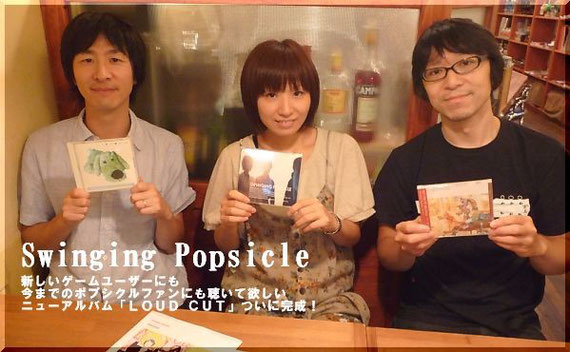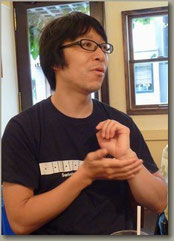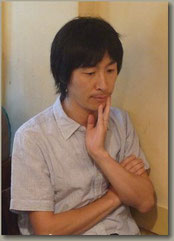
We're not the type of bands that arranges the tune through studio jams, but through accumulating and structuring of demo-tapes (Shimada)


--- By the way, not only this album, but all the Swinging Popsicle albums have even number of Japanese and English songs. Why is that?
Fujishima : Hmm...well, that just happened naturally. Foreign music is definitely the fundamental factor of our musical backgrounds and the band itself started out from the idea of playing music in which we love. Therefore, the lyrics of our very early years were English only. Then, we've fortunately caught the chance to debut in the pop music scene. As our listeners will of course be Japanese people, we started shifting our music towards Japanese lyrics pops, cause it may sound a bit lame just singing English songs. Sometimes I intentionally mix up the languages, like switching into English in the bridges. For example, since our band focuses highly on the tritone harmony of the bridges, it sounds awkward when a male chorus sings "私 (I, in the feminine form of Japanese) something ~ ". I prevent those problems by writing the bridge lyrics in English, cause "I" in English doesn't matter whether the person is male or female. So sometimes I intentionally aim to write the lyrics gender-neutrally, or sometimes rely on it. Well, it's just that I simply like doing it that way. I enjoy making efforts in the pronunciation of English sound more naturally, like "Gotta work a bit harder on this word". Maybe I may self-proclaim as a English geek. lol As all three of us are pretty much interested in English, we didn't have problem in singing or understanding the lyrics, so there were no reason screen off the usage of English. After we went into the indie pop music scene, it became even more reasonless to constrain our languages and came to the decision that we should use the language that suits the song. There are songs that really suits and grooves well with English pronunciation. For example, you can only put one phonetic Japanese character in one note, but in English, you can put in words such as "well" in one note. English and Japanese is totally different, the taste of the song depends on the language used. Therefore, I think it's best to use the language that brings out the full potential of the song. When my linguistic image of the song isn't settled down yet, I'll ask "Which one do you prefer, English or Japanese?" to the composers. Then, they'll reply like "My image was in English", or "Whichever's fine with me", or "How about writing it in Japanese?".
--- Amongst the tunes composed by Hirata-san and Shimada-san and thinking in comparison, is there any tendency in choosing the language?
Fujishima : Never compared it but, hmm...
Hirata : I've never thought of it too, but feels like the lyrics for Shima-cchi's tunes tend to be written more often in English than mine.
Fujishima : Well, Shima-cchi's definitely composing more songs than Hirata-kun, so that maybe natural.
Hirata : Also, Shima-cchi's demo-tape sounds more "English" like.
--- Since you perform live in other countries, did it feel helpful that English songs are in the repertoire?
Fujishima : Yeah, but we didn't imagine releasing our songs oversea. In the very early years, we just simply headed towards what we wanted to play.
--- What brought the very first trigger to perform overseas?
Hirata : Our first performance overseas was in Korea, because I heard the fact that there are people in Korea who loves Japanese guitar pop cultures. Then I've asked the people of our label to get in touch with the label in Korea to do the tour, with Swinging Popsicle, Plectrum and advantage Lucy. There, we got a chance to know people who's a Popsicle fan and felt happy. So we've already visited Korea 5~6 times, having those links.
--- I understand that Swinging Popsicle loves The Beatles by listening to your tunes, but at the same time, I find that programmed sounds are very neatly elaborated. Wearing two hats, both the analog and digital side of the music.
Hirata : I think that's correct.
--- How do you do the recording in the studios?
Hirata : The characteristics of Swinging Popsicle is like this; there's the absolutely talented singer with the two composers Shimada and Hirata composing tracks for her, so there's two sides in sound producing. So I don't interfere much with Shima-cchi's tracks and vice versa. I think it's a very rare style of composing music, but this makes our tastes of music reflect on the tunes and differentiating the two composers. Recently, we sometimes even have occasions that we first listen to the tune at the process of mixing the sounds! lol
--- So all three won't gather up for the studio recording?
Shimada : Yes.
Fujishima : It's been like that recently. Sometimes our first chance in listening to the tracks is when we're doing the first mix or the first mastering.
--- Then, if Shimada-san does the composing, Hirata-san doesn't come to the studio when putting in vocals?
Fujishima : I don't see him recently. These days, I sometimes record the vocals even without Shima-cchi. lol
Shimada : For example, Hirata-kun's tracks are digitalized and sent online, then send I it back after putting the guitar solo in.
Fujishima : Same with the vocals. Putting the vocals into the digitalized track, and sending online.
Shimada : Then, a reply comes from him like "Thanks for a great guitar solo" lol. And that's done with the composing.
Fujishima : Same here. "Just to the point!" he says. lol
Hirata : I could request Shima-cchi to change the phrases or slight nuances of here and there after I've received the guitar solo from him, but since we've been playing together for long, he already knows what I want and I'll give him an OK and reply, "Thanks for great guitar solo".
Shimada : We're not the type of bands that arranges the tune through studio jams. It has been from the Sony Music years, that we bring the demo-tape to the meeting. That demo-tape is already the final draft and the blueprint of the tune. So, we're the type of bands that creates the sound through accumulating and structuring demo-tapes.
--- So, even though it is called as "demo", it's already like a finalized track.
Shimada : Yes. We've been doing it like this for 10 years and basically hasn't changed. As the digitalized garage style recording is beginning to be the mainstream of creating music, it enabled us to compose our tracks more freely.
--- But how do you manage to get on well in live performances with that style? You can't prevent from having the tunes that's often included in the setlist, or tunes that's rarely played live.
Fujishima : Yes, yes, that's true. So we've never played the tune "Go on" live, cause it's hard to replicate and play live. So we do have tunes that we never play live. We might try it on the rehearsals, but remove it from the setlist cause it doesn't sound good in live.
--- In the live performances, do you try as hard as possible to replicate the concepts of the CD? Or do you live arrange it to a whole new world? How do you do it?
Fujishima : Depends on the tune, but there are more tunes that separates the image from the original CD.
Hirata : When it comes to tunes that's structured accumulatively, we can't prevent from lacking instrument players on stage. But our tunes stands alone well just with the lyrics and the melody, even though all the instruments are screened off. We always keep that in mind when composing, so we have this sort of certainty that "Even though we're lacking instruments, it will sound nice". So when we try out extreme approaches like doing live arrangement only using the acoustic guitar and the vocals, it comes out nice. So I'm not much obsessed in replicating the CD, but when composing the tune, I sometimes strongly feel that "This tune's gonna sound nice when played live". Also, since we basically create the tune by oneself, there's going to be different ideas from another perspectives when we bring it to the studio, with those ideas, the tune will be sophisticated further. So we live arrange the tunes with all three of us in that sense.
--- There are some people who never play their tunes live, as their tunes are programmed and can't be replicated live, but Swinging Popsicle works on those programmed tunes. It's very Popsicle-like.
Hirata : Might be. I hope there's not going to be periods where there's no live performances like The Beatles did.
--- We hope so too.
Hirata : I feel live performances very exciting, as it is a very special place where we can try out the latest sounds.
--- Perhaps, don't you like the ELO as well?
Hirata : Bingo. He (Shimada) loves it.
--- I thought so. I can see the influences when listening to "Go on".
Shimada : I'm working on a tune right now that has licks like Jeffrey Lynne. lol
Fujishima : The temporal title for the song is "ELO".
Shimada : Well, ELO also has strong influences from The Beatles, so we still have The Beatles on our roots.

--- By the way, how is the live performance going to be after the album is released?
Hirata : The tracks are basically set, but we're planning some tunes with guest players, or maybe playing it with less than three members on stage. It should be able to bring out the full potential of Popsicle tunes. Also, the atmosphere of the live house (Shimokitazawa 440) suits our taste of the music.
--- So, the setlists will be basically set up from this album?
Hirata : We'll have that in mind too, but since we're having this long discography, we want to balance the setlist so that everyone can enjoy it.
--- Can I have a comment from each of you towards the fans as the ending of this interview?
Shimada : Thank you for listening to our CD and coming to our live performances. Through the 10 years of activity of this band, we've already challenged on lots of stuff, but we'll still keep progression to look for interesting approaches. We're never going to let the story end. We'll pursuit our music and keep on progressing, so please be with us.
Fujishima : First of all, I'd like to thank that there's a fan website of ours managed by one of our fans, which triggered this interview project. There is an official website, but I've heard that there's this communication going on between the fans through those fan sites. I'd appreciate that fans are communicating through Swinging Popsicle and hope that the movement swings higher and higher. Providing our interview to this fan community, I think the fans will be happy with it. So we'd like to progress higher with the support of our fans' movement and wish that "LOUD CUT" will be more sensational. People who've never listened to our music, please listen to it through this website! Of course it will be enjoyable for the concurrent fans as well to, so please do count on us!
Hirata : This is a comment that I've always wanted to say to the fans, "Please be more proud in being a Swinging Popsicle fan". Despite this situation having the information about the music scene flooding nowadays, you've found us from millions of informations and kept tight and stayed tuned to our music without being washed away, and that's something you should be proud of. We'll keep on proudly providing sophisticated music with confidence, so please stay tuned on us!
--- Thank you very much.
- Coverage was done in the end of August, 2009.
- Please use the comment column below for the opinion and the impression.

コメントをお書きください